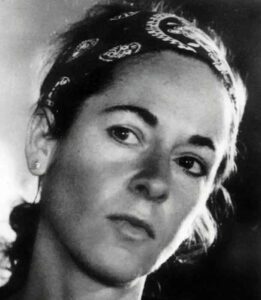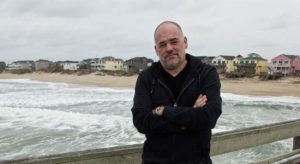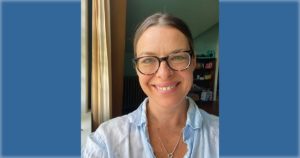
by Julia Bouwsma
As a poet who lives off-the-grid in the woods of Northern New England, my working practice has come to align with the seasons.
In winter I hunker down and write, recalling my first winter in Maine when I hunched by the woodstove watching the snowdrifts swirl and amass at my kitchen window as I wrote annotations and papers and poems for my first year of my Goddard MFA.
In early spring, when the letting down comes—the maple trees releasing their sugar and the snow melt burbling down the road—something in my heart unclenches as it prepares for the unfurling green that will soon envelope my hillside, and I begin to brainstorm new ideas and projects.
In summer, I work the gardens, letting words sift through my mind as I crawl on my hands and knees, my palms sunk deep in the soil. And in fall, as I gather the apples and split the firewood and prepare for yet another winter, I reflect on the cycle of it all—how everything mysteriously seems to come around again, how we return each year back to where we started, more weathered but also richer, more fertile.
During my autumn contemplation, I often think back in particular to a small moment that occurred for me in October of 1992, a moment which seemed to me for years to be fairly inconsequential but has since solidified in my mind as one of those oddly defining moments.
I was in seventh grade and my English teacher had given the class what was no doubt supposed to be a fun assignment: to decorate a small Halloween pumpkin according to a literary theme of our choosing. It was supposed to be fun, but I am neither a natural decision-maker nor particularly crafty.
So I procrastinated.
And the night before the pumpkin was due, I found myself in tears and still without a topic.
My father was the one who first suggested the Edna St. Vincent Millay poem, “First Fig,” that four-line stunner that reads:
My candle burns at both ends;
It will not last the night;
But ah, my foes, and oh, my friends—
It gives a lovely light!
The poem struck me like an electric current. Or, in any event, it was enough to dry my tears and set me to work. I carved a divot at top of the pumpkin and one at the bottom and affixed white emergency candles at both ends. I copied the poem out and backed my copy with construction paper. The pumpkin rested crookedly, as I couldn’t quite figure out how to make a sturdy stand for it. And the red and orange tissue paper I taped to the wicks didn’t look much like flames. In fact, my pumpkin looked a bit sad once I lined it up next to others, which were all much more elaborate from an artistic perspective if not a literary one.

But Millay’s poem, “First Fig,” took up permanent residence in my heart that evening. In just four lines, this little gem of a poem consolidated all of my ambitions, my frustrations, my romantic idealizations. It was half blessing, half revenge. It burned, burned itself up, with passion. And it became a smoldering, mostly subconscious mantra as I grew older, as I finished school, worked to be a better writer, moved to Maine, and eventually became the poet I am today.
Today—twenty-seven Octobers later—I find myself writing this piece at my kitchen table, looking out onto the damp fog that swathes my land in western Maine, on Millay Hill where Edna St. Vincent Millay’s paternal great-grandmother, Sarah Millay, lays in a small cemetery just a hundred yards to the west, behind a rusted chain link fence.
Thirteen Octobers ago, as my partner and I were driving by the local dump, I looked out my window and saw the sign for Millay Hill Road. Ah, my foes, and oh, my friends, I thought. I felt a little spark. Millay Hill, I said. I want to live there some day! And then somehow, magically, a property became available on the other end of the Millay Hill Road several years later. It was October again, peak foliage season, and as we walked the emblazoned woods and traced the mossy, collapsed stonewalls, we knew we’d found our home. I didn’t know then that the ancestors of my land were also Edna St. Vincent Millay’s ancestors—I discovered that years later—but I felt the magic little spark at once and I followed my instinct.
Now, in the eleven Octobers that have passed since, I am at the early stages of beginning a book of poems about Edna St. Vincent Millay, exploring my connection to her through poetry and through this land I love so deeply. And each time I think of “First Fig” and of Millay, I am reminded of the unexpected ways in which poetry foments our obsessions—how four little lines can stick inside of us, rubbing at us like the grain of sand inside a mollusk, shaping us, setting our paths, even as we stumble through life unaware.
I am reminded of how the work of poetry is one of intuitively identifying and following the unexpected trails we encounter as we go, of how each trail leads eventually to another. Of how poetry, language, takes us places we didn’t intend to go. And of how, in tracing the journeys that have led us to these places, we discover that we have unintentionally found our home.
What language have you been unconsciously carrying with you through the years and where has it led you?
Julia Bouwsma lives off-the-grid in the mountains of western Maine, where she is a poet, farmer, editor, and small-town librarian. She is the author of two poetry collections: Midden (Fordham University Press, 2018) and Work by Bloodlight (Cider Press Review, 2017). Honors she has received include the 2019 and 2018 Maine Literary Awards; the 2016-17 Poets Out Loud Prize, selected by Afaa Michael Weaver; and the 2015 Cider Press Review Book Award, selected by Linda Pastan. Her poems and book reviews can be found in Cutthroat, Grist, The Ilanot Review, Poetry Daily, Poetry Northwest, RHINO, River Styx, Verse Daily, and other journals. She serves as Library Director for Webster Library in Kingfield, Maine. Read more of Julia’s work at www.juliabouwsma.com.
This blog post has been edited from the original found at http://www.writerintheworld.com/
To get more information about Goddard’s MFA in Creative Writing go to: https://apply.goddard.edu/register/inquire







